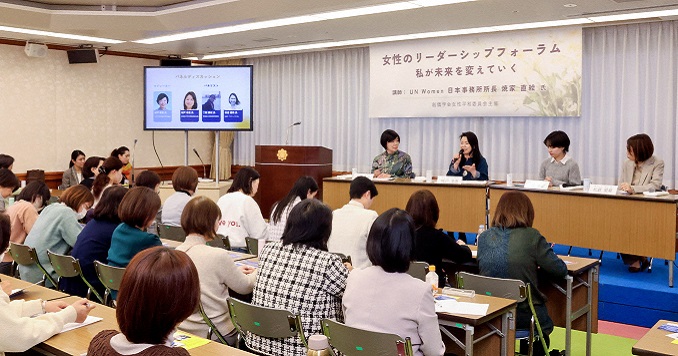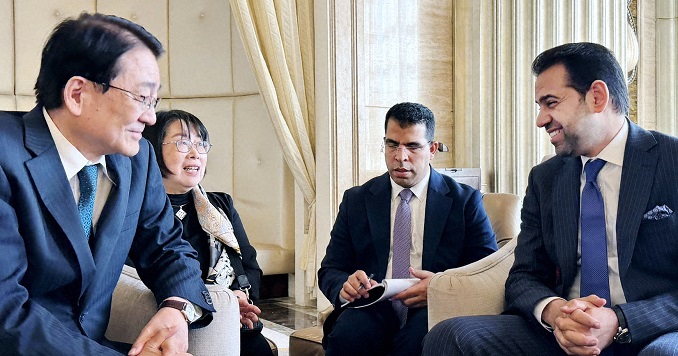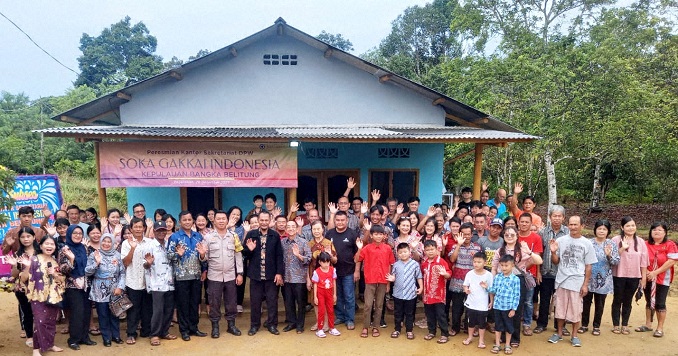- Small
- Medium
- Large
- Home
- In Society
- News Headlines
News Headlines
News Highlights from Seikyo Shimbun
(the Soka Gakkai's daily newspaper)
-
Women’s Leadership Forum Held in Tokyo Japan

On February 14, the Soka Gakkai Women's Peace Committee hosted an event, attended by some 1,600 people both in-person and online, titled “Women’s Leadership Forum—I Will Change the Future ” in Tokyo. Naoe Yakiya, director of the UN Women Japan Liaison Office, gave a keynote lecture. She emphasized the importance of recognizing unconscious biases as well as those imposed by society and, regardless of gender, building allies to create an environment in which women can take up leadership roles and gender bias can be reduced.
At the panel discussion that followed, Sachie Joto, founder of a children’s community cafeteria, graduate student in development economics Yuki Nihei and human rights educator Aiki Matsukura shared their diverse experiences and perspectives of leadership. Ms. Matsukura was featured in the Changemakers: Stories of Young Human Rights Educators documentary. -
Soka Gakkai at Annual Zayed Award for Human Fraternity UAE

On February 4, Soka Gakkai Vice President Hirotsugu Terasaki attended the 2026 Zayed Award for Human Fraternity ceremony in Abu Dhabi. Religious leaders from around the world also attended the ceremony. The award recognizes individuals and organizations that work to bridge divides and create human connection, contributing to human fraternity, coexistence and peace.
The day before the award ceremony, Mr. Terasaki met with Judge Mohamed Abdelsalam, secretary-general of the Zayed Award for Human Fraternity, and delivered a letter for His Eminence the Grand Imam of Al-Azhar Ahmed Al-Tayeb from Soka Gakkai President Minoru Harada. During their exchange, Judge Abdelsalam emphasized the importance of heart-to-heart exchanges between people. -
New Center Opens in Indonesia Indonesia

On December 28, 2025, Soka Gakkai Indonesia opened a new center in Pagarawan Village on Bangka Island, off the east coast of Sumatra. The ceremony was attended by 115 people including Village Head Ahmad Zainudin, Soka Gakkai Indonesia members, local residents and guests. Village Head Zainudin shared his high expectations for the positive contributions the center would make to the local community.
-
Initiatives
 Articles by Soka Gakkai members around the world on local activities to promote peace, culture and education.
Articles by Soka Gakkai members around the world on local activities to promote peace, culture and education.
-
Global Issues Resources
 Resources created by the SGI to raise awareness of global issues and inspire action toward a peaceful, sustainable world.
Resources created by the SGI to raise awareness of global issues and inspire action toward a peaceful, sustainable world.
-
SGI Action for Peace Website
 SGI’s peace activities around the world and resources and information related to key issues including disarmament, human rights and sustainability.
SGI’s peace activities around the world and resources and information related to key issues including disarmament, human rights and sustainability.




